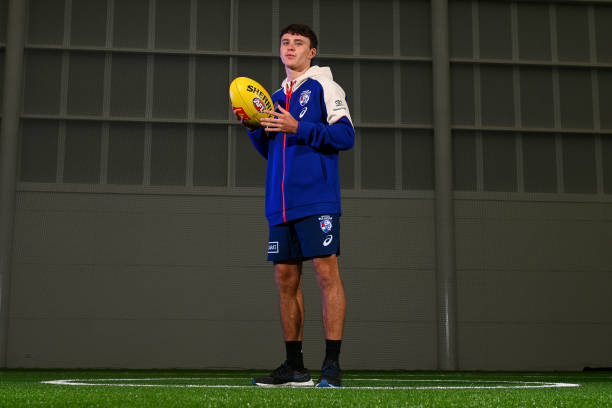Western Bulldogs’ young forward Aiden O’Driscoll’s dreams of a burgeoning AFL career have been shattered as he announces his medical retirement from the sport. The 18-year-old, drafted in 2023, was dealt a devastating blow during a preseason match simulation earlier this year when a collision with teammate Bailey Williams resulted in a brutal head injury.
O’Driscoll’s potential career trajectory was abruptly halted before it even had a chance to take off. The Bulldogs, in a statement released on Tuesday, confirmed the unfortunate news, detailing the severity of the injury and the subsequent medical advice received.
“Aiden suffered a significant head injury during a preseason training session in January. Following extensive clinical assessments, investigations, and expert consultation that included a review by an Independent Medical Concussion Panel, Aiden has been advised to retire from contact sports in the interests of his long-term health and wellbeing,” the statement read.
This announcement underscores the harsh realities of professional sports, where the pursuit of success and glory is often intertwined with the risk of injury, particularly in high-impact contact sports like Australian Rules Football. The incident serves as a poignant reminder of the fragility of athletes’ careers and the importance of prioritizing their long-term health over short-term gains.
The Bulldogs’ decision to support O’Driscoll and his family during this challenging period reflects the club’s commitment to its players beyond their on-field performances. It’s a testament to the understanding that the well-being of athletes goes far beyond their contributions to the team’s success.
O’Driscoll’s premature retirement also aligns with a broader trend within the AFL and sports in general, where the management of head injuries and concussions is receiving heightened attention. Collingwood’s Nathan Murphy and Melbourne’s Angus Brayshaw are just two recent examples of players forced into early retirement due to concussion-related issues, signaling a growing awareness of the long-term consequences of head injuries in sport.
In response to such incidents, the AFL has implemented stringent measures aimed at minimizing the risk of head injuries. From cracking down on dangerous tackles to considering limits on contact training, the league is actively working to create a safer environment for its athletes.
However, O’Driscoll’s case serves as a stark reminder that despite these preventive measures, injuries can still occur, and the impact on individuals and their families can be profound. It highlights the need for ongoing research, education, and support systems to better understand and address the complex challenges associated with head injuries in sport.
As Aiden O’Driscoll embarks on a new chapter in his life, the football community rallies around him, offering support and encouragement for his future endeavors. While his AFL career may have been cut short, his resilience and courage in the face of adversity serve as an inspiration to us all, reminding us of the importance of prioritizing health and well-being above all else, both on and off the field.

